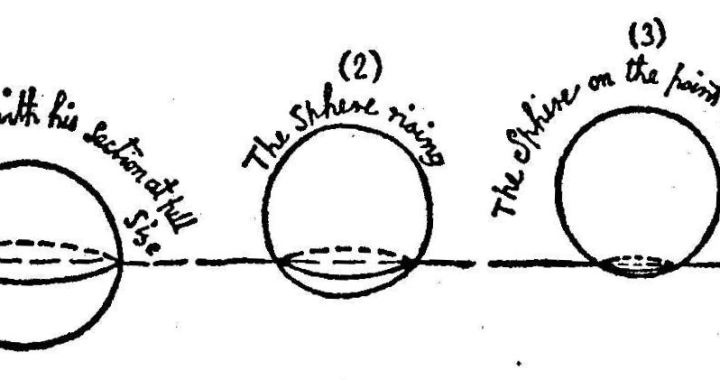As part of His teaching on prayer in the Sermon on the Mount, Jesus gives us this bit of observation:
14 For if you forgive others for their transgressions, your heavenly Father will also forgive you. 15 But if you do not forgive others, then your Father will not forgive your transgressions.
Matthew 6:14-15
In his little book called “Flatland”, Edwin Abbot describes a world in which two-dimensional characters live within a two-dimensional plane and can thus only perceive each other as lines. If a three-dimensional character such as a sphere intersected their world, they would have the strange and perhaps miraculous experience of seeing a dot appear before them, which gradually grew into a line, and then once again shrank to a dot and disappeared. In order to understand this, the inhabitants of Flatland would have to be lifted up out of their two-dimensional plane so that they could see the true nature of the sphere, and then it would be simple and obvious.
We have a similar problem here. We are by nature judgment driven law-loving sinners. We measure everything by its adequacy. We strive through our deeds to prove our worthiness to each other at all times. In other words we live in a universe governed by a vast division between moral good and aesthetic good. We live in a world where the air we breath is all about doing the good we must, and avoiding the damaging pleasures we long for, and of fearing the consequences for failure. Standards of excellence, judgment, failure, and fear are our flatland.
In this statement of Jesus, we have an otherworldly object intersecting our flat moral world. When we try to interpret it from our flatlander perspective, it makes no sense at all. We think, “I thought God was a forgiver, an unconditional lover of sinners. Yet we have this moral imperative to forgive, on which our own forgiveness from God hinges. So my forgiveness hinges upon how well I forgive! What could this mean?”
If you step outside of the world of threat and expectation and the earning of spiritual wages, you can see something. First, this is not an imperative. It is an observation. If you live and breathe and think and exist in an environment where you believe in the power of Christ’s blood shed for sinners, you have escaped the two-dimensional prison. You really have come to believe, not simply that you alone are forgiven, but that there is a possibility of real lasting definitive forgiveness at all. You believe in substitutionary atonement. You have the perspective of knowing that a huge penalty can be paid for sin by someone else in place of you. As a corollary you believe that this kind of thing works, in general. So you have a way to see that for someone else who believes this, it also works. You can trust that their faith is also real. So you have entered this little universe with them where forgiveness and acceptance wins the day, all the time and in general. Unconditional love has become your new perspective.
The people still dwelling in flatland see this, and they are scandalized by this forgiveness. They think it means that people are being allowed to get away with sin. They think it is antinomianism, because they can only interpret grace from inside the flat world of threat and coercion and fear of punishment. But once you escape the prison of ought, you see people from the perspective of mercy and love, and you see that threat is not a motivator but a prison. You know you abide in love and forgiveness, and you have become a citizen of the world where this is the new rule. You forgive others because you believe in blood-bought forgiveness, in general. So you think this is what defines everyone else, not their guilt.
If you don’t forgive others, you think it is their failure that defines them. That means that, in general, you don’t believe in the the power of forgiveness and the power of the gospel. You haven’t by faith been introduced into this grace in which we stand (Romans 5:1-2). But if you do forgive, it means you have entered the realm where forgiveness works — for you and for them. You no longer have the need to see others as defined by their lack of moral success, because you see them as being defined by the love which God has for them.


Wow! … What a refreshing and totally freeing word of liberty
You go bro 🙂
Fun analogy… and love alien righteousness being expanded to alien grace :). Blessings, Jim!